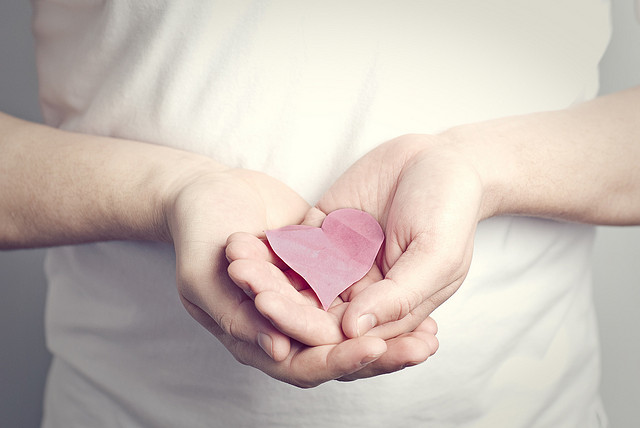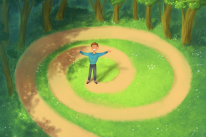
“You, yourself, as much as anyone in the entire universe, deserve your love and affection.” ~The Buddha
Bodhicitta. Metta. Loving-kindness. Compassion. Whatever you call it, this is what spiritual practice is all about, right? Long story short, the teachings instruct us to generate these vast motivations and wishes that all sentient beings be free from suffering and experience true and lasting happiness.
It sounds wonderful, doesn’t it?
So why is it that so many of us are still unhappy, even after years of sitting on the cushion? Why do we still struggle with depression, anxiety, fear, and even self-loathing?
Now, I’m not the first practitioner to point this out, but the main reason is that we forget the most important word in these prayers, aspirations and practices: all.
This, as they say, means you.
This would seem easy, wouldn’t it? To include ourselves in this great wish for limitless happiness seems to be nothing short of the most common sense. After all, you want to be happy, don’t you?
But the truth is, this is very hard for us here in the west. At a very deep and wounded level, we don’t really think we deserve any of that. So even though we might spend a great deal of time thinking about others, we wholeheartedly neglect ourselves.
At least I do.
You see, before I discovered Buddhism and meditation, I was a drug addict. During those twenty-three years of madness, clinging, and sorrow, I hurt a lot of people. But mostly, out of self-loathing and shame, I hurt myself.
When I finally made the choice to give recovery a real shot, I had to begin the long, slow, and always painful process of making amends, not only with my friends and family, but also with myself.
I started this process by making a whole-hearted effort to care for myself. I swallowed my pride and sought out the help I needed.
I went to therapy and recovery meetings. I started to take care of my body through diet and exercise. But most importantly, I learned how to tell myself three simple words:
I love you.
This was the most difficult thing of all, but once I got used to the idea that I was worthy of my own love, I began to get the strange and wonderful feeling that I was becoming my own best friend.
Five years later, I’m still building this friendship and, like any other relationship, it takes work, care, mindfulness, and patience. I have to remind myself every day that despite all my shortcomings, I truly am worthy of love and kindness.
This new relationship with myself hasn’t always been easy. There are still days when the old reflexes kick in.
Without even thinking about it, I find that I’m being too hard on myself and that I’m not giving myself enough room. Then I feel tight and tense as I start to sink and feel that old unworthiness creeping back in.
But over the years, I find that I’m more able to catch myself before I fall too deep down that hole.
Through mindfulness and habituated practice, I’m now able to remind myself of the truth: I’m not a terrible person. I’m not unworthy. I’m not unlovable. And it’s then that I can begin the relatively easy climb out of a hole that used to always go so much deeper.
This has not been easy, but I’ve found that the practice of loving myself has not been impossible either. And gradually, I’ve realized that all the effort I’ve put into it has been worth every drop of sweat.
So give this a try:
Before you sit down to meditate or do any kind of spiritual practice, find yourself a mirror and a quiet place. Use whatever techniques you know to get yourself into a relaxed state.
Now take a good, long look at the person there in that mirror. Who is s/he really? Look deep into his/her eyes and find the human being there, the person who is, like all sentient beings, just doing the best s/he possibly can.
Be gentle. Be kind. Be soft. Be friendly. And as you do all of that, generate a feeling of warmth and love for that person and tell him or her with all your heart:
I love you. May you be happy. May you be at ease. May you be free from suffering.
Say this again and again, all the while looking deeply into your eyes.
This practice is not always all fuzzy-warmie-happy-time. It’s possible that many hurt feelings, shortcomings, and fears will come up at this point. It’s okay. Cry if you need to, then just let it all go as you remind yourself that you are deserving of love, just the way you are.
We can’t expect to go from wounded to healed and whole overnight. It takes time, work, patience, and a lot of help. We have to put in the hours and make the effort to care for ourselves.
We have to find the ways and methods that work best for us, seeking out the best help, kindness, and guidance that are available.
But if we stick with this practice of loving ourselves, I think we’ll find that we’ve built ourselves a solid foundation for deep and truly meaningful spiritual lives.
Photo by seanmcgrath
About Chris Lemig
Chris Lemig is the author of The Narrow Way: A Memoir of Coming Out, Getting Clean and Finding Buddha. He is deeply concerned with issues relating to the mental and spiritual wellbeing of modern culture and is looking for ways to bring happiness and contentment back into our lives. He writes about coming out, sobriety and Buddhism on his blog http://www.thenarrowwaybook.com.













 Though I run this site, it is not mine. It's ours. It's not about me. It's about us. Your stories and your wisdom are just as meaningful as mine.
Though I run this site, it is not mine. It's ours. It's not about me. It's about us. Your stories and your wisdom are just as meaningful as mine.
The meditation you describe could be useful for some. I find, that to complete it, however — one has to become friends with the mirror first! — Just a thought.
Agreed, Nicole! When I started this practice I couldn’t turn the light on. I just left a crack in the door so I could just make out my face. It was hard even then! But that’s part of the practice: learning to see ourselves for who we really are, not our projections and insecurities. Thanks for reading and have a wonderful day!
I don’t know how Tiny Buddha always posts exactly what I I’m struggling with, but I’m so grateful. Thank you for writing this, I do the same thing. That little self-loathing voice starts to creep in and even though it’s in direct conflict with my practice, sometimes I don’t recognize it and it goes on and on. Thank you for giving me a tool to stop it in it’s tracks and replace it with love. Thank you.
And thank you for reading, Sharon. I’m glad you found it to be helpful.
Oh, me too! So far, I just keep coming back to this article to remind myself of the steps I need to take. It’s scary. I am so used to putting myself down. One step at a time right?
Chris, thank you so much for this article. I’m an alcoholic/addict sober for four months and struggling with self-acceptance/love right now. I always worried that if I actually accepted and loved myself, it would make me a more self-centered/selfish/bad person. I’m discovering that if I remember to begin with taking care of myself (in healthy ways), then it makes my care for others infinitely more profound and loving.
Jennifer, I’m sure your not happy to hear that you are right where you are supposed to be. I know because I’ve been there myself. See my post. You are right on the money when you say self care is not selfish behavior in its essence. We alchys/addicts didn’t know how to take care of ourselves, so this becomes a learned behavior through the steps of the recovery process. I would often here if I wanted self-esteem to do esteemable acts which includes caring for ourselves and others. Keep doing what you are doing….Bravo!
Thank you for sharing, Jennifer and congratulations on your sobriety. Whether it’s four months or four years it’s a huge accomplishment. Give yourself credit where you deserve it! But also, don’t forget to take it easy and take it slow. You’re doing great! Sending you love and light for your journey ahead…
Jennifer
I think you’ve got that exactly right. when you’re where you need to be you are doing the universe good. I like to listen to swami satchidananda on you tube. He talks a lot of sense, just like you 😀 happy days
hi Jennifer,
My friend sent me here to read this article but I want to tell you that I’m proud of you. My ex is 15 yrs sober and the first year was difficult. Baby steps, you can do it. You are adding to the world, thank you.
Chris, I too am 4 years sober and the thing that I’ve struggled with the most is self acceptance, self hate, perfectionism etc. In the process, I went thru a debilitating 6 month depression but I did not drink. I’ve come to discover that it was because of these feelings about myself that caused the depression. I still struggle with them a bit here and there but through a meditative practice, a connection to source energy, my program, helping others and self acceptance through right thinking/right action I’ve made huge strides from this state of mind. Thanks so much for sharing your experience, strength and hope.
Thank you for reading Tom and congratulations on your sobriety! You bring up a good point with the other elements you’ve brought into your practice and recovery. There are many things we need to do to engage in meaningful spiritual practice. Daily practice, being of service, working a recovery program are all pieces to this wonderful puzzle we’re putting together. Thanks for sharing!
Thanks for this Chris. I’ve struggled with an addiction of my own, and I think the shame I carry about that sometimes gets in the way of me loving myself completely. As though I won’t be lovable until I’m fully recovered and not struggling anymore. At the same time, I don’t know if it’s possible to BE fully recovered until I love myself completely. So I appreciate this post and the exercise you provided. I need to remind myself that EVERYONE struggles, just in different ways, and my particular way of struggling doesn’t make me any more or less deserving of love.
Thanks for sharing, Johanna. It good for me to hear, too, that others struggle with the same issues. Nevertheless, it is sometimes hard to believe that we are deserving of love “exactly the way we are”-that means shortcomings (perceived and real) and all. But over time, it does become easier and easier to become certain that we are saying to ourselves in the mirror is true. Good luck to you and thanks for reading!
A heart-felt article, Chris.
As I read it, it dawned on me that self-loathing, or just the feeling of never being GOOD ENOUGH, is an ADDICTION too – and a really hard one to break. My wife say’s being unhappy is a choice. Yes and no. Who wants to be sad? I certainly don’t. But it’s not easy to just say, I’ll be happy today, I’ll be content with myself, and be that way.
Like you said, Chris, it takes a lot of work to rewired our core beliefs. But your story is uplifting and encouraging and helps our process for finding peace.
Thanks for posting it.
Irv
Good point about low-self worth being an addiction, too. It is a pattern, a habitual way of thinking that we grow almost comfortable with over years and years. But the good news is, we can change it! Thanks for reading, Irving!
Re-wiring is the phrase I was using before I came across this article so I completely get what you mean! Best wishes!
Really i liked this a lot. I am also planning to follow this for the rest of my life surely without fail so that i would be in touch with myself. Thank you very much.
I appreciated you taking the time to read it. Thank you.
Bless you and thank you, this is beautiful.
And thank you!
I suffer from depression and Body Dysmorphia – not a day goes by when I dont hate myself in one way or another – but this moved me thank you for a beautiful article I will be putting it into practis 🙂 xox
I’m glad you found this article helpful, Rosalind. I found this technique to be very helpful as part of a holistic program to help with my depression/addiction. It’s not a cure-all, to be sure. But it’s something practical we can do to help ourselves on a daily basis.
This is exactly what I needed to read today as I walk through my own process of finding a path.
Glad it helped!
Beautiful piece! Very cathartic read, I found myself reading this at an appropriate time. Life is so dynamic that our relationships with ourselves also change and oscillate. It is hard to even think that something so familiar does not define us who we are. Will be heeding this practice today, thank you!!
And thank you for reading, Anna!
It’s amazing the growth that takes place when we love and accept ourselves fully. Thank you for the reminder to be gentle, kind, soft and friendly to myself : )
Glad you found this helpful, Sheila. Have a wonderful day!
A wonderful message just when I’m looking for it. This is something that I struggle with a lot and though I am not self destructive I have yet to learn to completely accept myself. Thank you for this article and insight.
Thanks for reading, Sati!
Chris, thank you. Like it was for everyone else who commented, this was what I desperately need to read. I think fate brought me to read your article. And it was beyond inspiring. It’s funny how a few thoughtful words and experiences can change someone. I will love myself now. Thank you.
I’m glad you found the article helpful, Hindulove Thanks for reading and good luck on your path.
Thank you so much for this! It was just what I needed today!
You know, as I read about trying out the practice, tears actually swelled in my eyes when I try to imagine/picture myself telling my reflection, “I love you. May you be happy. May you be at ease. May you be free from suffering.”. Even as I am typing this out, I felt… difficult, a sign that it still proves to be a struggle. I had no idea since when, probably when I was a kid, that I felt like the biggest loser in the world, an underachiever, and someone who’s probably invisible or insignificant to anybody.
I think, I just have to get used to being my own friend. I will try my best to love myself, I promise.
Thank you for sharing this Chris. I have been feeling very lost lately; I will try this exercise to see if I can pick myself up again since I have started to notice my self worth and value beginning to shrink while going through lots of big changes.I am worth more than that and I owe it to myself.
Wow I don’t know what to say, but to read all that made me cry…..I’m going thru a hard time myself right now and I never learned to love myself or being my best friend!!! Thanks for showing me there is still hope and its all on me to make a change…..wish me luck!!
Hello,
is very inspiring reading.I will try the mirror,hopefully is not going to broke in pieces.
Thanks Chris
The only way I’m able to do this is by creating an “inner best friend” who loves me and cares for me no matter what. Yes, it’s imaginary, but it works. Call me nuts, whatever. My inner best friend calls me on stuff all the time, so don’t think it’s letting me get away with stuff!
I’ve struggled with self-acceptance or self-compassion for a long time as the result of very critical parents and grandparents. I at long last spent almost a year in psychotherapy which helped. A book helped me a lot. It is called Soul Without Shame by Byron Brown. It helped me to see and avoid the inner Judge, and to allow my Soul to emerge by developing the response of compassion. Mindfulness helps with sensing and avoiding the inner Judge.
For me its a conditioning issue. You get told something enough and eventually you internalise it and tell yourself. I have battled and continue to battle through every day to believe that i deserve to love myself let alone be loved by another. Thirty years of conditioning means i even feel guilty if i run a bath for myself, or set aside an hour to do yoga and meditation. Its a daily struggle to remember that the past is the past and i now have the control to treat myself the way i want. I am going to save this article to re-read when i forget that its not selfish to treat yourself well.
Thank you.
All I must say is, thank you. Feeling whole again was feeling like a tease, this assures me that feeling secure is on my side, not an unreachable desire.
Thank you.